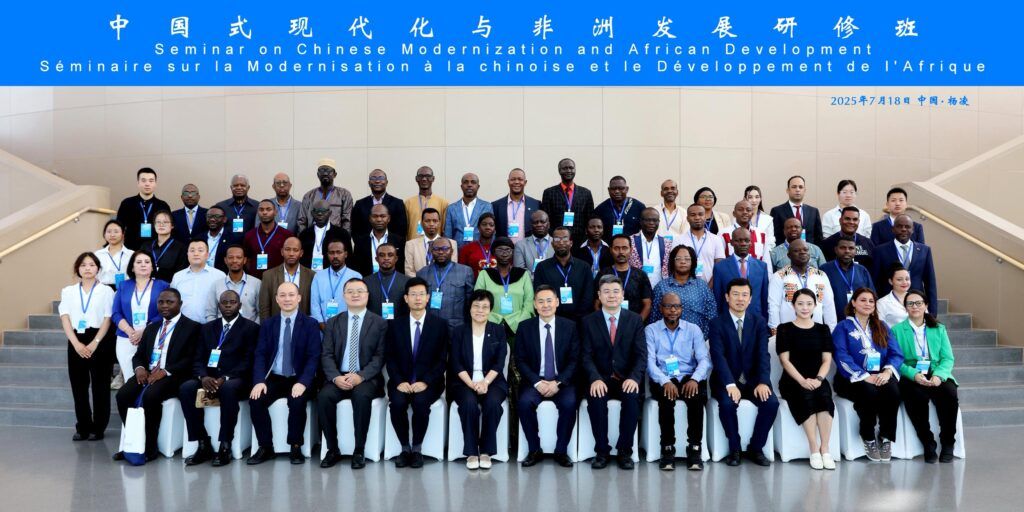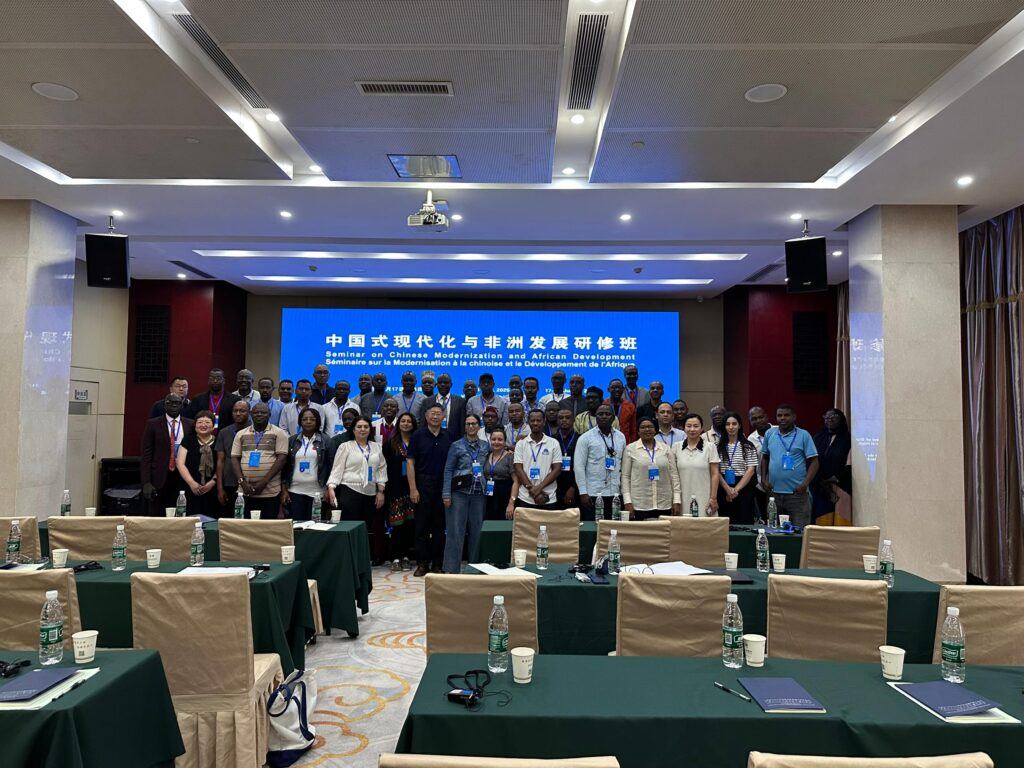In the vast arena of international relations, there are summits, forums, and then there is FOCAC—the Forum on China-Africa Cooperation—a diplomatic marriage between the world’s most populous nation and a continent of boundless potential. Since its launch in October 2000, FOCAC has been China’s strategic bridge to Africa’s resources, markets, and votes at the United Nations. For Africa, it has been a lifeline of roads, rails, hospitals, and hope. But for South Sudan, a country often late to the global development party, the train hasn’t yet left the station. The good news? There’s still time to buy a ticket.
FOCAC is not just about power suits and photo ops; it’s a goldmine of opportunity—if you know how to dig. With 53 out of 55 African Union countries onboard (only Eswatini is absent due to its diplomatic flirtation with Taiwan), FOCAC is Africa’s biggest multilateral engagement with China. It’s a billion-dollar conversation, a handshake backed by cement mixers, scholarships, and vaccine vials.
Let’s take a humorous but honest walk through this high-speed partnership—and see how South Sudan, often considered development’s lastborn, can finally grow teeth and chew on the same opportunities its older siblings have enjoyed.
China’s Grand Bargain: Why FOCAC Exists
FOCAC was China’s response to two things: the West’s tight grip on Africa and China’s insatiable hunger for resources. Let’s be honest—China didn’t wake up one day in 2000 and say, “We must help Africa find her dreams!” No. It was a calculated move—what diplomats politely call mutual benefit and realists call geopolitical chess.
China wanted oil, copper, rare earths, and market access. Africa wanted roads, schools, hospitals, and someone who wouldn’t lecture it about governance every five minutes. A perfect match!
Today, China is Africa’s largest trading partner, with trade volumes surpassing $250 billion. There are Chinese-built railways in Kenya, industrial parks in Ethiopia, and agricultural centers in Zambia. Even during the COVID-19 pandemic, China sent PPE, vaccines, and teams of doctors while the West sent Zoom condolences.
What’s in It for Africa?
Let’s unpack the benefits like a traveler opening a FOCAC-funded suitcase.
1. Infrastructure: Concrete Love
Africa’s landscape is littered with Chinese engineering. From Addis Ababa to Abidjan, you can’t drive more than 50 km without bumping into a Chinese-built bridge or road. China loves big projects—just give them land, permits, and a nod, and you’ll have a highway in six months.
2. Loans and Debt (the Friendly Kind)
China offers interest-free loans, concessional loans, and occasionally, debt forgiveness. Unlike the IMF, which gives you homework and a scolding, China gives you a loan and a bulldozer. Sure, there’s risk of dependency, but that’s another article for another Sunday.
3. Scholarships and Human Capital
Thousands of African students now say “nǐ hǎo” before they say “hello,” thanks to Chinese government scholarships. These students study medicine, engineering, agriculture, and even diplomacy—learning how to sign memorandums of understanding without blinking.
4. Trade and Market Access
Chinese supermarkets in Nairobi sell local mangoes. African coffee ends up in Beijing cafes. It’s not exactly balanced trade, but the doors are open.
5. Technology Transfer
From Huawei to hydroelectric power, China is equipping Africa with tech—whether it’s mobile phones or surveillance cameras (we’ll leave the privacy debate for tech nerds).
Why Has South Sudan Missed the FOCAC Party?
Here’s where the sobering laughter begins.
South Sudan is one of the most resource-rich but development-poor countries in Africa. It has oil, water, fertile land, livestock, and even untapped minerals. But since independence in 2011, the country has been like a kid with a toy store gift card but stuck at home fighting with siblings.
Civil wars, leadership challenges, weak institutions, and overdependence on oil exports have all combined to keep South Sudan in a perpetual state of “next time.” While Ethiopia built a Chinese-funded railway to Djibouti, we were still negotiating peace agreements in luxury hotels abroad. While Kenya was launching e-visas with Chinese consultants, our biometric machines were stuck in customs.
It’s not that China is ignoring South Sudan. Far from it. Chinese oil companies are deeply involved in South Sudan’s petroleum sector. Chinese peacekeepers have helped stabilize parts of the country. And China has even begun working on major infrastructure projects, like the Juba–Rumbek road, despite the risks. But South Sudan hasn’t positioned itself to fully embrace the broader FOCAC opportunities like other African nations have.
So, What Can South Sudan Do? Plenty.
Let’s stop seeing ourselves as the child left behind and start packing for the journey ahead. Here’s a development wish list South Sudan can bring to the next FOCAC meeting—preferably with humor, humility, and hard facts.
1. Infrastructure: Build, Don’t Beg
South Sudan needs roads, railways, airports, power stations, and even Wi-Fi. Why not propose a “New Nile Corridor”—a highway linking key oil and agricultural hubs with neighboring countries? Ask China to help build it under FOCAC. Include a railway plan too, even if it’s only on paper for now.
2. Agriculture: From Guns to Ploughs
With Chinese agricultural technology and know-how, South Sudan can shift from war to food security. Propose irrigation projects, seed banks, farmer training centers, and even hybrid rice programs like those in Madagascar. Let our soil feed our people—not our politics starve them.
3. Human Capital: Send the Youth to Learn
Instead of sending only politicians to conferences, let’s send young entrepreneurs, engineers, and educators. China offers scholarships and training programs. Let’s use them. Let’s even lobby for a China–South Sudan University of Technology based in Juba.
4. Health and Medicine: Beyond Clinics
Ask for help building a national referral hospital, regional health centers, and training institutions. China has done it in Sierra Leone and Uganda. Why not in Rumbek or Malakal?
5. Oil with Brains
Yes, China is in our oil fields—but we can negotiate better. How about local content requirements? More South Sudanese engineers and technicians, not just security guards. More refining capacity, not just exports through Sudan.
6. Digital Leapfrogging
While some nations crawled through the telephone age, others jumped straight to mobile. South Sudan can leap into digital governance, e-health, online education, and mobile banking with Chinese support. Propose a Smart South Sudan Initiative—it sounds fancy and may even work.
7. Cultural Exchange: The Soft Power Game
Let’s invite Chinese cultural centers to South Sudan—and send our dancers, poets, and singers to China. Let’s even co-produce a Juba–Beijing documentary. Relationships are not just about roads, but roots.
The FOCAC Equation: Benefits with Boundaries
Now, let’s be clear. FOCAC is not charity. It’s strategic partnership. China isn’t Santa Claus, and Africa isn’t a stocking. Every benefit has a cost, even if not monetary. Countries must negotiate smart, prioritize sustainability, and avoid debt traps.
That’s why good governance matters. Transparency, accountability, and smart budgeting are not just Western buzzwords—they’re survival tools. South Sudan must set up FOCAC liaison teams, engage civil society, and track project performance. No more “build first, explain later” policies.
Conclusion: South Sudan’s Time Is Now
We’ve missed many trains. But the FOCAC Express still has room. The next summit, the next bilateral meeting, or the next Chinese ambassador’s courtesy call could change everything—if we are prepared.
Let us not envy Kenya, Ethiopia, or Rwanda. Let us learn from them. Let us stop fighting over who sits on the throne of ashes and start building thrones of opportunity. Let us stop shouting at the dark and light our own candle—even if it’s made in China.
In the words of a wise South Sudanese elder: “A bird does not fly with one wing.” South Sudan has one wing—her natural resources. FOCAC could be the second wing. Together, they might just lift this nation into the skies of development.
Author Bio:
John Monyjok Maluth is a South Sudanese author of 100 books, public speaker, and advocate for peace through knowledge. He writes on development, leadership, and cross-cultural collaboration.Contact:
Email: maluthabiel@gmail.com
Phone: +211 927 145 394
Website: www.johnshalom.com/


